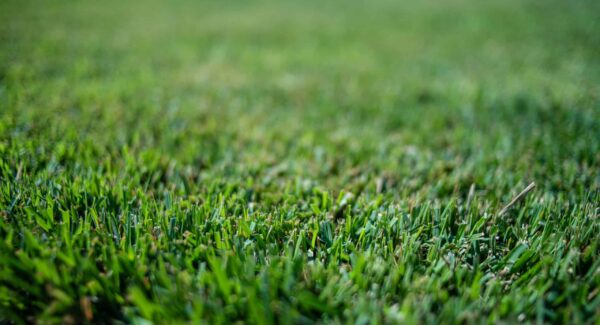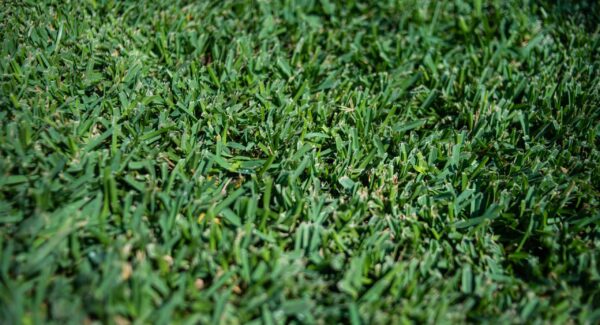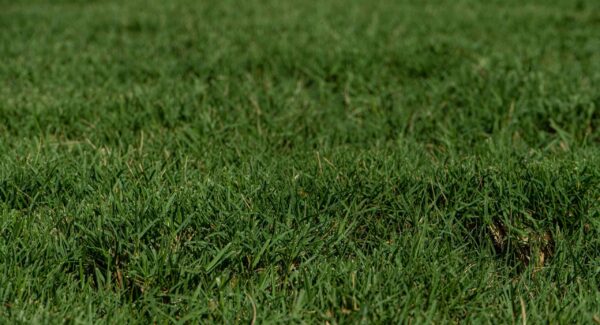Common Bermuda vs. Hybrid Bermuda – Comparison
Bermuda Grass continues to be a top choice for lawns. This warm-season grass is highly valued for its ability to withstand drought, intense heat, and high humidity.
With many varieties, it’s essential to know the distinctions among different types of Bermuda Grass to find the best match for your lawn. Whether you prefer a fine texture or extreme heat tolerance in your grass for your yard, there’s a type of Bermudagrass that will meet your needs.
Here, we explore the differences and advantages of common and hybrid Bermuda Grass.
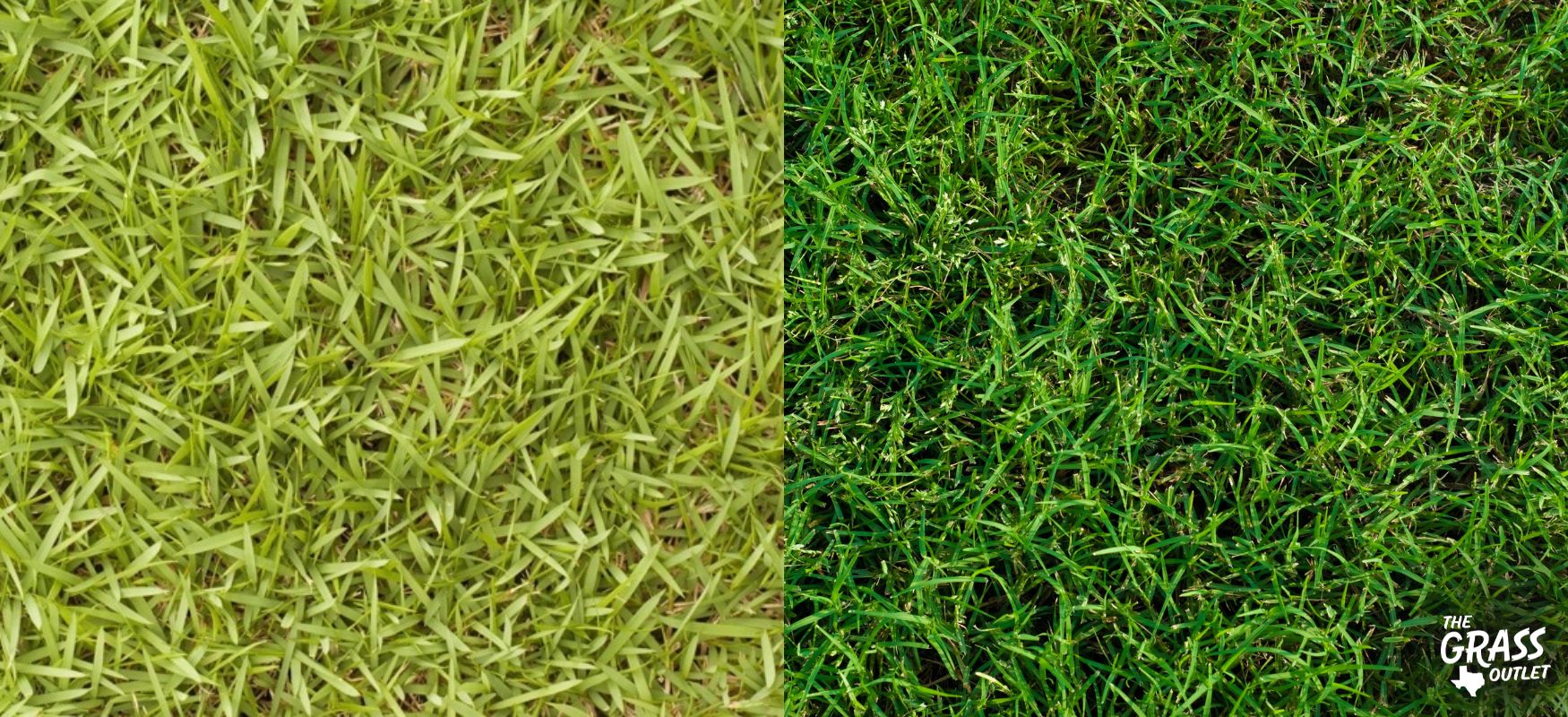
About Bermuda Grass
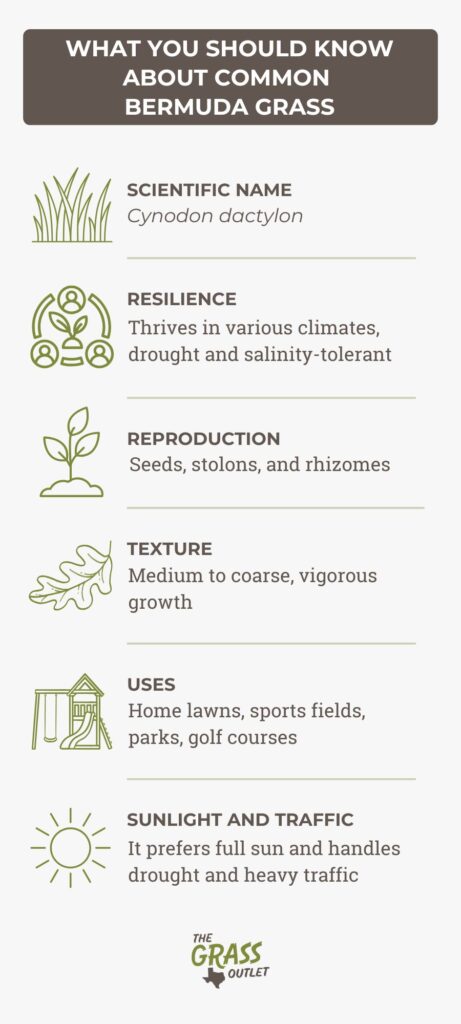
It thrives in locations with full, direct sunlight and well-drained soil.
This type of grass forms a robust, green, dense turf that adapts well to various soils and climates in warm regions. It boasts excellent resistance to wear, drought, and salt. It establishes quickly and can outcompete most weed species.
Bermuda lawn grass seed varieties offer homeowners an exceptionally fine-textured lawn, which, along with its ability to withstand heavy use and recover rapidly, makes it a preferred choice for many U.S. lawn owners and is often required by local HOA communities due to its resilience.
Bermuda Grass germinates most effectively when soil temperatures are between 65 – 75°F and daily temperatures consistently exceed 80°F. It thrives and remains green during the summer while entering dormancy in the winter.
Overview of Common Bermuda Grass
Common Bermuda Grass, scientifically known as Cynodon dactylon, is a naturally resilient species that thrives in diverse climates and soil conditions. Its genetic variability enables it to tolerate various environmental challenges, including drought and high salinity. This grass reproduces through seeds and vegetative means like stolons and rhizomes, aiding its rapid spread and soil stabilization.
It features a medium to coarse texture and vigorous growth habits, making it ideal for high-traffic areas.
Common Bermuda grass is commonly used in home lawns due to its ease of establishment and cost-effectiveness. It is also a primary turf species in sports fields, parks, and general utility turfs. It thrives in full sun, exhibits drought resistance, and withstands heavy foot traffic.
Overview of Hybrid Bermuda Grass
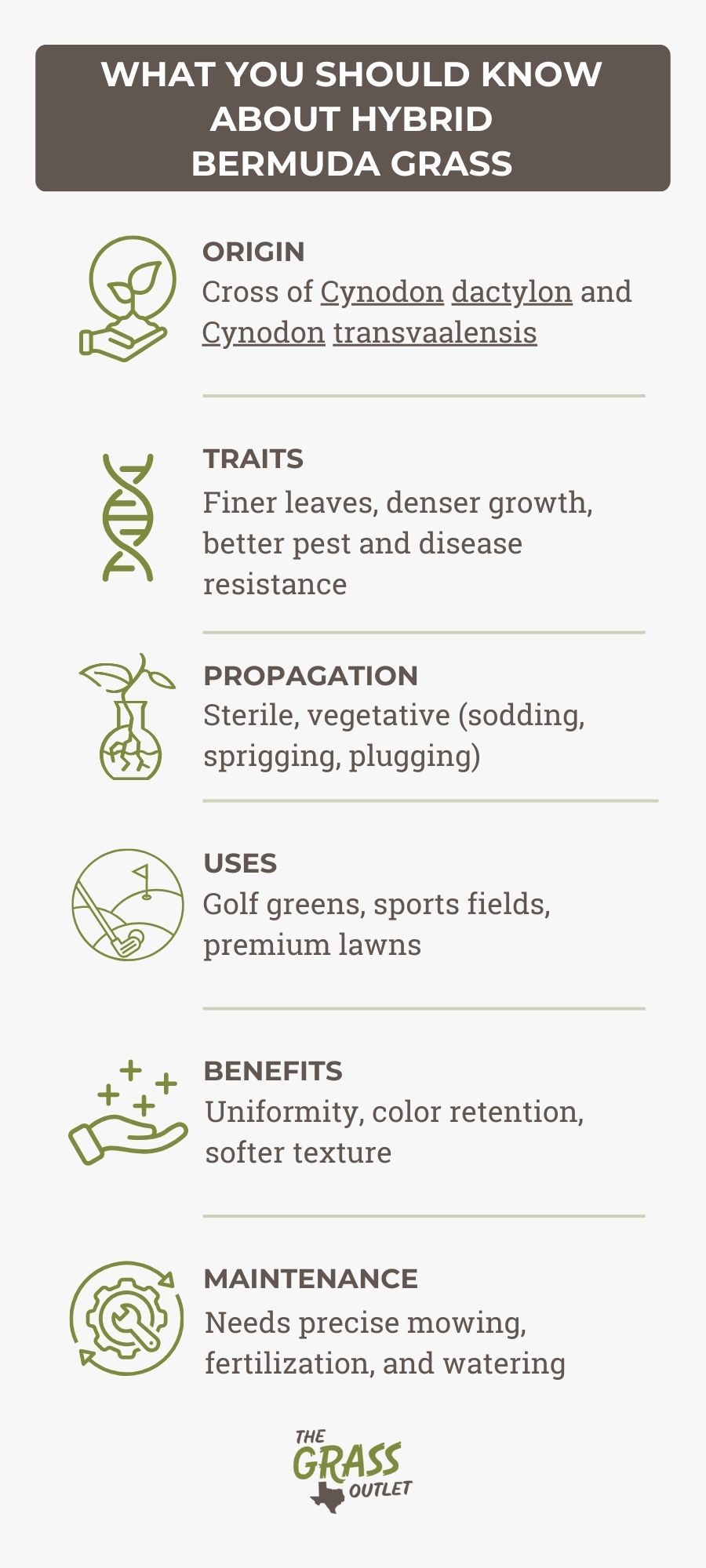
Because hybrids are typically sterile and do not produce viable seeds, they must be propagated vegetatively through methods like sodding, sprigging, or plugging. This genetic engineering results in varieties tailored for specific uses, such as golf course greens, sports fields, and high-end residential lawns. These hybrids offer enhanced uniformity, color retention during stress, and a softer feel due to narrower leaves.
However, despite being hybrids, these cultivars are technically Common Bermuda Grasses with upgraded characteristics sustained through vegetative propagation. They require more intensive care, like precise mowing, fertilization, and watering, to maintain their improved attributes over time.
Comparison: Common Bermuda vs. Hybrid Bermuda
Common Bermuda and Hybrid Bermuda offer distinct advantages depending on your lawn or sod landscaping needs. Here’s a comparison of their key characteristics:
Growth Rate and Density:
Common Bermuda Grass grows medium to fast with moderately dense turf. In contrast, Hybrid Bermuda Grass has a faster growth rate and tends to form thicker turf.
Establishment and Spread:
Common Bermuda Grass is established quickly from seeds and spreads via seeds and vegetative means. On the other hand, Hybrid Bermuda is typically established through vegetative methods and spreads rapidly once established.
Density and Thickness of the Turf:
Common Bermuda Grass has a moderate density and thickness. Hybrid Bermuda Grass, however, tends to have higher density and thicker turf.
Appearance and Texture:
Common Bermuda Grass features a medium to dark green hue and a coarser texture. Hybrid Bermuda grass, however, boasts a finer texture and a more consistent, vibrant green color, making it more visually appealing.
Visual Appeal for Different Uses and Durability and Wear Tolerance:
Common Bermuda Grass is versatile and suitable for various landscapes, including general residential lawns. Both are wear tolerant, but with its superior aesthetics, Hybrid Bermuda is preferred for high-end residential lawns, and sports fields where appearance and high traffic are priorities.
Disease and Pest Resistance:
While Common Bermuda Grass shows moderate resistance to common diseases and pests, Hybrid Bermuda Grass generally boasts enhanced resistance and is less susceptible to issues.
Common Issues and How Each Type Handles Them:
Common Bermuda Grass shows moderate resistance to pests and diseases but may require more frequent monitoring and treatment. Hybrid Bermuda Grass typically has enhanced resistance to typical issues, making it less susceptible and easier to manage.
Longevity and Overall Health of the Lawn:
Both grass types can have a long lifespan with proper care, but Hybrid Bermuda grass tends to be longer-lived and maintains better health under intensive management.
Maintenance Needs:
Both types require regular watering, but they can withstand drought once established. Mowing heights and frequencies vary, with Hybrid Bermuda Grass often requiring more precise and frequent mowing. Fertilization needs also differ, with Hybrid Bermuda Grass typically needing more frequent and specialized fertilization.
Watering:
Common Bermuda Grass requires regular watering, typically about 1 to 1.5 inches weekly. Hybrid Bermuda Grass also needs regular watering but may demand more precise and consistent moisture levels to maintain its enhanced appearance.
Mowing:
Common Bermuda Grass should be mowed to a height of 1 to 2 inches, requiring weekly mowing during the growing season. Hybrid Bermuda Grass usually needs more frequent mowing, often two to three times a week, to maintain its finer texture and uniform appearance, with a recommended height of 0.5 to 1.5 inches.
Fertilizing:
Common Bermuda Grass benefits from a balanced fertilizer applied every 6 to 8 weeks during the growing season. Hybrid Bermuda Grass requires more frequent and specialized fertilization every 4 to 6 weeks, focusing on higher nitrogen content to support its dense growth and vibrant color.
Comparison of Long-term Maintenance Efforts:
Common Bermuda Grass generally requires moderate maintenance efforts over time. In contrast, Hybrid Bermuda Grass demands more intensive and specialized care to maintain its optimal appearance and performance, particularly in high-end residential lawns and sports fields.
Varieties Offered by The Grass Outlet
419 Tifway Bermuda Grass
Tifway 419 Bermuda has become the most popular warm-season turf across the United States and has been the preferred Bermuda Grass in Texas for many years.
This grass thrives in full sun and is known for its fine blades. When regularly mowed to a low height, Tifway 419 forms a dense turf often chosen for sporting applications and home lawns. Its fast growth ensures quick recovery from damage, which is an essential factor in effective Tifway 419 Bermuda grass maintenance practices.
In addition to being a top choice for sports turf, Tifway 419 is also ideal for a frequently used lawn. It features a deep green color, fine texture, and excellent resistance to weeds and diseases. Its dense, rapidly spreading growth habit allows it to recover quickly from injury, making it one of the most durable hybrid Bermuda options.
Tifway 419 Bermuda Grass Characteristics:
- Wear Tolerance: Very Good
- Shade Tolerance: Good
- Drought Tolerance: Very Good
- Insect Resistance: Excellent
- Disease Resistance: Very Good
- Weed Control: Very Good
- Mow Height: 1–2 inches
Celebration Bermuda Grass
Due to its drought tolerance and excellent recovery ability, Celebration Bermuda has gained mass appeal in home lawns and sports fields. It is a finer-bladed Bermuda grass with an exceptional root system that allows rapid recovery. Celebration Bermuda grass maintenance recommendations are relatively straightforward, making it ideal for commercial landscapes, parks, and other areas where pets and children frequently play.
Celebration Bermuda Grass is blue-green and forms a dense turf when adequately maintained. It is also renowned for its drought resistance and tolerance, demonstrating its ability to survive droughts and maintain a good appearance during dry periods. This variety also performs better in moderate shade conditions than other Bermuda Grass types, although it thrives best in full sun.
- Wear Tolerance: Excellent
- Shade Tolerance: Moderate
- Drought Tolerance: Excellent
- Insect Resistance: Very Good
- Disease Resistance: Excellent
- Weed Control: Very Good
- Mow Height: 0.5–1.5 inches
Choosing the Right Bermuda Grass for Your Lawn
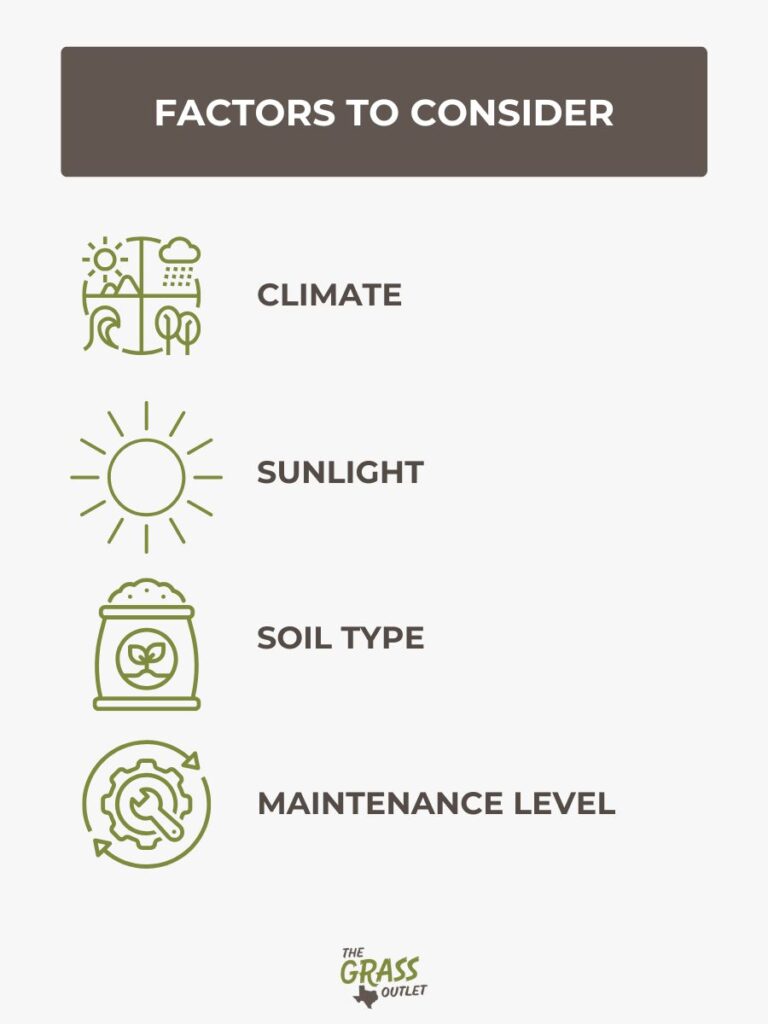
Climate: Choose a Bermuda Grass variety that thrives in your region’s specific temperature and rainfall patterns.
Sunlight: Bermuda Grass requires full sun for optimal growth, but some are more shade-tolerant.
Soil Type: Bermuda Grass can adapt to various soil types but performs best in well-drained soils with good fertility.
Maintenance Level: Consider the level of maintenance you’re prepared to provide, as some Bermuda Grass types demand more frequent mowing, fertilizing, and watering than others.
Final Thoughts
If you desire a lawn that is heat—and drought-resistant and can handle high traffic, Bermuda Grass might be the ideal choice.
Bermuda Grass is an excellent option for homeowners living south of the transition zone who need a lawn that can withstand the intense heat of southern summers. In choosing the best Bermuda Grass for your lawn, consider your lawn’s needs and individual requirements. Assess your lawn’s sunlight exposure and foot traffic to understand the tolerance and maintenance levels required. In addition, prioritize traits and determine which attributes are most important to you, such as color, texture, shade tolerance, and drought resistance.
If you seek professional assistance, contact The Grass Outlet’s lawn care experts, who can provide insights specific to your area. For more information, visit our website and explore our Bermuda Grass varieties.
Sources
- Common vs Hybrid Bermuda Grass
- Common Types of Bermuda Grass
- Types Of Bermuda Grass – Which Varieties Are Ideal For Your Lawn?
- Celebration Bermuda
- 419 Tifway Bermuda
